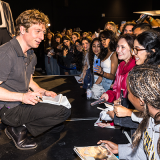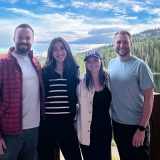From Chapman Student to Writer on Marvel’s Hawkeye Alumni Spotlight: Katie Mathewson (BA/SW '11)
January 13, 2022
Katie Mathewson graduated from Chapman University in 2011 with a BA in Screenwriting. Since graduating, she has gone on to work for Comedy Central as a writer’s assistant on @midnight and worked on the writing staff of Pitch on FOX. Most recently, she wrote an episode of Marvel Studios show Hawkeye for Disney+ with her writing partner Tanner Bean. We recently had the opportunity to ask Katie a few questions about how her career journey post-Chapman led to her becoming a Writer on Hawkeye:
Please share your career path with us: how did you go from being a Screenwriting major at Chapman to writing for Hawkeye?

Mathewson working on set of Pitch.
Like most people, my path was neither linear nor direct. During my senior year at Chapman, I knew I wanted to find a stellar internship that could (hopefully) set me up when I moved to LA with the hordes of other unemployed writers. So, I turned to my favorite professor – the one who lit my “TV writing fuse” in my very first screenwriting class – Bill Rosenthal. Bill introduced me to Gail Berman, one of the powerhouses behind BermanBraun. That internship led me to my first job post-graduation, where I worked my way up from receptionist to executive assistant to the writer/editor for Wonderwall, one of BermanBraun’s digital sites. There, I became plugged into celebrity news, social media, and pop culture, which led to a call from one of my former Dodge College friends, Hans Sahni. He thought I’d be right for an opening on “@midnight,” a new Comedy Central show about pop culture news and weird stuff on the internet.
It was around this time that I met my writing partner, Tanner Bean, who had been working as Dan Fogelman’s (Producer and Screenwriter) assistant and right-hand man. Tanner and I became friends and eventually started writing together. In 2016, Dan had the good fortune of selling two pilots in one season: This Is Us to NBC and Pitch to Fox. Soon after, Tanner and I had the good fortune of getting staffed on Pitch, which is where I met Jonathan Igla. Then, three years after Pitch ended, Igla called us in for a staff meeting at Marvel, where he had been hired as the Head Writer on Hawkeye. (A staff meeting, for those who don’t know, isn’t a job offer; rather, its the opportunity for a job offer if the meeting goes well. Fortunately for us, it did.)
I know what some of you may be thinking, that it sounds like I got lucky. More than once. And – although this abbreviated version of my story is missing a lot of nuance and detail – there’s no doubt I’ve had several guardian angels along the way. It’s true what they say: much of this industry is “who you know.” Which scared the crap out of me when I heard it within the first week of film school, because I didn’t know anybody. But it’s worth pointing out that the other piece of the equation, arguably the more important piece, is hard work. It’s persistence. And talent. And affability. Without those things, luck runs out pretty quickly.
What is it like to work on such a huge Marvel project like Hawkeye? What is your favorite memory from the project?
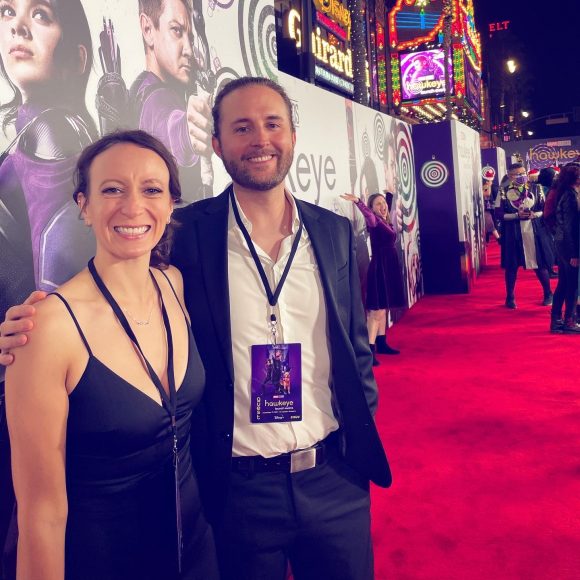
I know it’s cliché to say that writing on Hawkeye was a dream come true, but… c’mon, it’s Marvel Studios! Who doesn’t dream of contributing to the MCU?? (Aside from Martin Scorsese, I suppose.) Before working on Hawkeye, I had already been a huge fan of the Marvel movies, and Tanner had grown up reading the comics, so even waiting in the lobby for our staffing meeting felt like a career milestone.
Considering that, how can I pick a favorite memory from a million unforgettable moments? Like, walking into the writers’ room on day one and seeing a floor-to-ceiling mural of Hawkeye comic book panels, only to walk in several weeks later to find the real Ronin suit from Endgame on a mannequin? Or, knowing that I was writing for a character that was created by Stan Lee himself, evolved through brilliant writers like Matt Fraction, and brought to screen by Jeremy Renner and Kevin Feige. But in all honesty, the best day is probably when Tanner came in with a pitch for how to connect Maya Lopez to both the Tracksuit Mafia and Ronin, which led to us getting to use Maya in the show… and to me and Tanner telling her origin story in our episode, “Echoes.” (That’s the cool thing about writing partners. Sure, you have to share your paycheck, but you also get to share credit for their good ideas!)
Were there any specific resources (i.e., certain professors, courses, workshops, career advising, etc.) at Chapman that contributed to your career journey post-graduation?
I’m a big believer that “you get out what you put in.” There are a lot of terrific resources at Dodge… especially if you’re willing to step outside of the box and put in a little extra work. I spent a lot of my time exploring classes and opportunities beyond my major’s core requirements because I knew being a writer isn’t just writing. If you’re a TV writer, it means being in pre-production meetings; and going on location scouts; and working with the cast and crew on set; and watching dailies; and sitting in the edit bay. So, while I was at Dodge, I tried to get as well-rounded of an exposure to other disciplines as possible. Don’t get me wrong, I’m not a cinematographer and I’ve forgotten almost everything I learned about Avid. But I did spend time on set. I audited producing classes. I went to screenings and listened to guest speakers and asked questions. I made friends with Directing and Editing and Screen Acting students. Because you never know where that knowledge or experience or connection will take you, or how it’ll pay off down the road. (Ten years post-graduation, I’m still reminded of that. The most recent writers’ room I staffed was a result of a recommendation from my friend Elias Gertler, a producer at The District who was once my fellow tour guide at Dodge.)
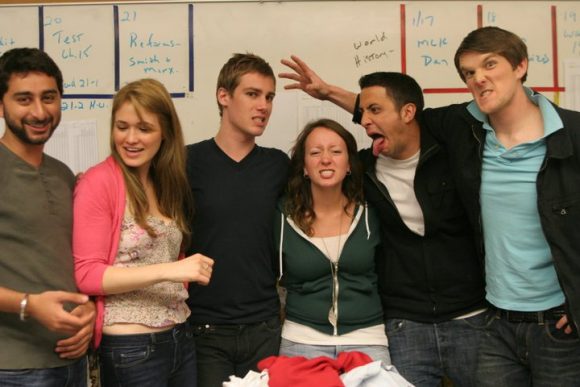
On set photo of Mathewson and classmates at Chapman.
What is the best advice you have received that you would give to current students?
“Don’t be an asshole.” It sounds flip – maybe even crass – but it’s the easiest and best way to set yourself up for success, and it starts now, while you’re in school. You don’t have to be the most popular person or even the most outgoing, but you should always be kind. Be patient. Be helpful. Lose your ego, or at least keep it in check. I knew my time at Dodge was the beginning of establishing my reputation, so I tried to be as friendly and pleasant to work with as possible, because I knew my classmates would one day become my co-workers. They’d be the ones in positions to hire me, or at least do coverage on my scripts. They’d get asked: “You went to Chapman, right? Do you know Katie Mathewson? What’s she like?” In this industry, being good at your job is the baseline. But – at the end of the day – we all just want to work with people we enjoy being around.
Any parting thoughts or advice?
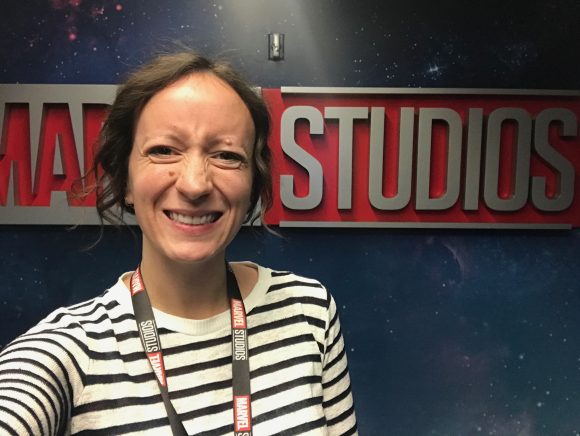
Mathewson at Marvel Studios.
At this point in my career, I’ve done a fair amount of pitching and development. Time and time again, I hear the same thing: “Why you? Why are you the person to tell this story?” We live in a time where people are hungry for authenticity. They want fresh perspectives. There’s no doubt you’ve heard “write what you know,” but it’s important to expand the definition of what that means. It’s about finding the universality in who you are and the themes that recur in what you’ve lived through. For example, I’m gay. That doesn’t mean I can – or should – only write queer female protagonists. It does mean that I can authentically write a character who’s going through a “crisis of self,” or a superhero who has to keep their true identity a secret. Another example: I survived a catastrophic motorcycle accident in my early 20s and had to learn to walk again, so I find myself gravitating to stories about second chances. You get it. Collect as many experiences as you can. Turn your pain into art. Take what makes you you, and let it inform your storytelling. (But, please, drive safely. There are more pleasant ways to gain life experience than getting hit by a car.)

